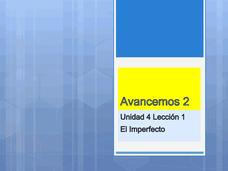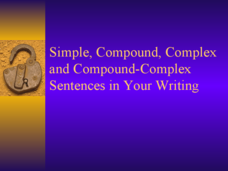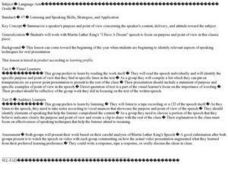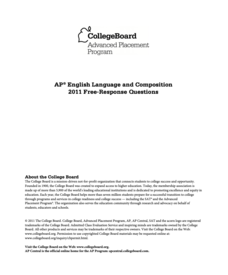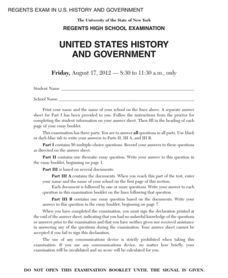Curated OER
El Imperfecto
You class can learn all about how to form the imperfect with -ar and -er/-ir verbs. The slides do cover the only verbs that are irregular in the tense and the situations for which you use the imperfect (plus examples). Go over the...
EngageNY
Adding to Cascading Consequences and Stakeholders: Local Sustainable Food Chain
Equip the class to perfect their presenting skills. To prepare for an upcoming oral presentation, scholars create and analyze an anchor chart for effective speaking skills. Pupils also use their research to add to their Cascading...
Curated OER
Spanish Sentence Structure
Instruct your class on how to put together a sentence in Spanish. The resource covers the different parts of speech, showing how the Spanish version of each sentence compares with the English version. While there are no procedures...
Curated OER
Figure of Speech
Examine the changing nature of language in the U.S. View and discuss excerpts from a PBS documentary with your class and then conduct Internet research, and complete a team project on the evolution of teen expressions.
Student Achievement Partners
Laura Hillenbrand's "Unbroken" and Jeanne Wakatsuki Houston and James D. Houston's "Farewell to Manzanar"
Passages from Unbroken and Farewell to Manzanar provide the context for a study of the historical themes of experiencing war, resilience during war, and understanding the lasting trauma of war. Appendices include extension activities,...
Curated OER
Improving Your Style Pronouns
In this writing style worksheet, students learn to improve their style by replacing nouns and noun phrases with pronouns. Students complete three activities to help them with pronouns.
Curated OER
Parts of Speech
For this parts of speech worksheet, students recognize affirmative and negative expressions. Students put the correct response in ten sentences.
Administrative Office of the US Courts
Texas v. Johnson
Which right does the Constitution weigh more heavily: the sanctity of the American flag as a symbol of national unity, or the right to burn the flag in protest? The 1989 Supreme Court case of Texas v. Johnson explores a state's right to...
Curated OER
Langston Hughes Was a Dreamer Too
Encourage your pupils to imagine their own dreams for the future. After studying three poems by Langston Hughes and listening to Dr. Martin Luther King, Jr.’s I Have a Dream speech, young poets craft their own dream stanza.
National Endowment for the Humanities
“Read All About It”: Primary Source Reading in “Chronicling America”
Can investigative journalism become too sensationalistic and accusatory, or is it vital for the survival of a democracy? Middle schoolers analyze primary source documents from early 20th-century newspapers as well as Theodore Roosevelt's...
Curated OER
When Is a Noun a Verb? Examining Double Duty Words
The New York Times' Learning Network provides great lessons! This one uses articles from the paper to help readers understand homonyms like mail (verb and noun). It also includes an exercise in reading informational text. Links to the...
Curated OER
Excessive Nominalizations
Eliminate unnecessary nominalizations from your middle schoolers' writing! After reviewing a reference page for the -tion ending (and when it can be excessive in writing), students rewrite eight sentences to change nominalizations to a...
Curated OER
Simple, Compound, Complex, and Compound-Complex Sentences in Your Writing
Have you ever graded a stack of essays that felt like a series of bland simple sentences? A helpful grammar presentation will help learners spice up their writing by varying their sentence style, making them stronger and more attentive...
Curated OER
The Future Tense
What will your Spanish class learn today? Maybe they will learn all about the future tense! Take a look at this resource for information on ways to talk about the future without actually using the future tense, regular and irregular...
Curated OER
How Safe is Your School Bus?
Students research various aspects of school bus safety such as what makes a bus safe and unsafe. Using provided Internet sites and others students examine what the National Highway Traffic Safety Administration has to say and also what...
Curated OER
Spanish Reflexive Verbs
Why is it that in English you shave, and in Spanish you shave yourself? Spanish uses reflexive verbs. Your pupils can master reflexive verbs with the explanation provided here. Conjugation of this type of verb is described with...
Curated OER
Martin Luther King's "I Have a Dream"
Dr. Martin Luther King's "I Have a Dream" speech provides the text for a study of how to analyze a speaker’s content, delivery and attitude. Visual learners identify specific lines that reveal King’s purpose and point of view while...
K20 LEARN
The Emancipation Proclamation: Expanding The Goals Of The Civil War
Should Juneteenth be recognized as a national holiday? To prepare to take a stance on this question, young historians first analyze the Emancipation Proclamation and compare it to Lincoln's first Inaugural Address. Scholars then read an...
EngageNY
Studying Conflicting Information: Varying Perspectives on the Pearl Harbor Attack, Part 1
Scholars read President Roosevelt's Day of Infamy speech and analyze the speech's words using close reading guides. Readers determine Roosevelt's point of view after reading the speech and filling in the guides.
College Board
2011 AP® English Language and Composition Free-Response Questions
Mammals can be carnivores, omnivores, and herbivores, but what about locavores? A set of free-response questions from the 2011 AP® English Language and Composition exam introduces test-takers to the term, which describes people who try...
Anti-Defamation League
Hair Discrimination and the CROWN Act
The CROWN Act (Creating a Respectful and Open World for Natural Hair) is the subject of the lesson that asks groups to research the stories of five different women and share their insights in a jigsaw activity. Participants then craft...
New York State Education Department
US History and Government Examination: August 2012
Just how far can the American government go during war time? With primary source documents, learners consider the effects on restrictions of freedom of speech, the detention of American citizens of Japanese descent, and the Patriot Act...
National Woman's History Museum
Ida B. Wells: Suffragist and Anti-Lynching Activist
Suffragette, investigative journalist, and civil rights activist Ida B. Wells is the focus of a lesson plan that has young historians study the work of this amazing woman. Scholars watch a video biography of Wells, read the text of her...
Curated OER
Inventing and Presenting Unit 3: Persuasive Speaking and Invention Promotion
Students write a proposal for a speech. Students prepare appropriate visuals for use in the proposed speech. Students produce one or more graphs that summarize the results from the experimentation. Students deliver an effective speech in...


